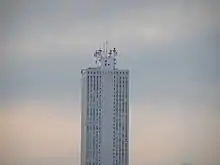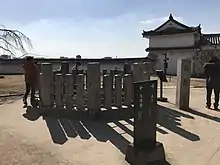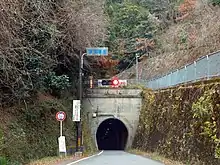List of reportedly haunted locations in Japan
This is a list of reportedly haunted locations in Japan.
| Part of a series on the |
| Paranormal |
|---|
Tokyo

Sunshine 60 in Ikebukuro, Tokyo.
- Sunshine 60
- Built on a site where Japanese war criminals were executed.[1]
- Masakado’s grave
- Purportedly the resting place of Taira no Masakado, a rebellious Heian-period warlord. There have been cases where construction workers disturbing the grave had accidents, with some dying as a result.[2][3]
- Oiwa Shrine
- Believed to be the former home of a woman who was murdered by her husband.[1]
- Hachiōji Castle
- An abandoned castle site. Visitors to the ruins claim to hear the screams of women.[4][5]
- Prudential Tower
- In 1982, a fire killed 33 people, making people believe it to be haunted.[6][7]
- Akasaka Mansion hotel
- A women claimed she was dragged across her room by an unseen force.[8]
- Doryodo Ruins
- Two bodies were allegedly found on the site, a body of an elderly woman in 1963 and a young college student in 1973. The temple got torn down in 1985. Visitors to the sight claim to hear the screams of the two murder victims.[8][9]
- Ireido
- Located in Yokoamichō Park. A memorial was built on the grounds as a way to calm the spirits.
Yamanashi
.jpg.webp) Aokigahara Forest
Aokigahara Forest- Aokigahara
- One of the most popular suicide-sites in Japan,[12][13] reputed to be haunted by the yūrei of those died there.[14][15]
- Oiran Buchi
- According to a legend during the Warring States period, there was a gold mine in the area. The 55 prostitutes working there were decided to be killed to prevent them from sharing the information about the gold.[16][17]
Other

Okiku Well in Himeji Castle
- Himeji Castle
- Believed to be haunted by Banchō Sarayashiki[5]
- Mount Osore
- Believed to be a gateway to the underworld.[18]
- Gridley Tunnel
- Located on a naval base in Yokosuka, Japan. Between midnight and 1 am on rainy nights, a samurai appears to solo explorers.[19]
- Maruoka Castle
- According to legend, in 1576, a widow named Oshizu agreed to become hitobashira if her son became samurai for the lord. However, the lord was later transferred, and the promise and was broken. So Oshizu flooded the castle’s moat every April.[5]
- Mannenji Temple
- A buddhist temple that houses Okiku the haunted doll.[20]
- Ryokufuso Inn
- Is allegedly home to a Zashiki Warashi. Some guests have claimed they were touched by invisible fingers as they slept. Others have claimed to have seen ghostly white balls floating in the air.[21]
See also
References
- Fields, Lilly (25 October 2011). "Top Tokyo haunts: five scary spots". The Japan Times. Retrieved 17 September 2020.
- Clements, Jonathan (9 June 2019). "The curse of Masakado: why Tokyo is still haunted by a malevolent ghost". The Guardian. ISSN 0261-3077. Retrieved 20 September 2020.
- "The curse of Japanese samurai Masakado". CNN Travel.
- Parvis, Sarah (January 2008). Creepy Castles. Bearport Publishing. ISBN 978-1-68402-859-7.
- "4 Beautiful Castles Home to Terrible Ghosts". All About Japan. Retrieved 17 September 2020.
- ホテルニュージャパン跡地はそれからどうなったのか [Hotel New Japan, a former site and what it became?]. Timesteps (in Japanese). Retrieved 21 September 2020.
- 千代田区永田町2-13 ホテルニュージャパン跡地 (幽霊、心霊) [Chiyoda-ku Nagata-chou 2-13 - Hotel New Japan site (yūrei, spirits)]. 東京幽霊名所 (in Japanese). 3 February 2017. Archived from the original on 3 February 2017. Retrieved 21 September 2020.
- Poole, Steven (2016-10-28). "Scary streets: which are the world's most haunted cities?". The Guardian. ISSN 0261-3077. Retrieved 2020-09-23.
- "CEC中央電子:八王子散歩みち". 2004-06-12. Archived from the original on 2004-06-12. Retrieved 2020-09-23.
- Rambelli, Fabio (13 June 2019). Spirits and Animism in Contemporary Japan: The Invisible Empire. Bloomsbury Publishing. ISBN 978-1-350-09710-0. Retrieved 17 September 2020.
- Brunvand, Jan Harold (2012). Encyclopedia of Urban Legends. ABC-CLIO. ISBN 978-1-59884-720-8.
- "Desperate Japanese head to 'suicide forest'". CNN.com. Retrieved 17 September 2020.
- Atlas Obscura. "The Second Most Popular Place to Commit Suicide". RealClearScience.com. Retrieved 20 September 2020.
- "Suicide Forest". WNYC. Retrieved 17 September 2020.
- From Travel + Leisure. "World's most haunted forests". BBCc.com. Retrieved 19 September 2020.
- "8 Creepiest Places in Japan". Just Japan Stuff. 2017-03-02. Retrieved 2020-09-26.
- Ross, Catrien (2015-11-03). Supernatural and Mysterious Japan: Spirits, Hauntings and Paranormal Phenomena. Tuttle Publishing. ISBN 978-1-4629-1671-9.
- Bornoff, Nicholas (2008). Japan. National Geographic Books. ISBN 978-1-4262-0234-6.
- Gray, Amy (23 August 2011). "The scariest spots around the world". BBC.com. Retrieved 20 September 2020.
- "Haunted Doll Okiku". The Paranormal Guide. Retrieved 2020-09-27.
- http://travel.cnn.com/explorations/none/ryokufuso-inn-cnngo-visits-ghost-kamemaro-just-hotel-burns-ground-791463/
This article is issued from Wikipedia. The text is licensed under Creative Commons - Attribution - Sharealike. Additional terms may apply for the media files.
